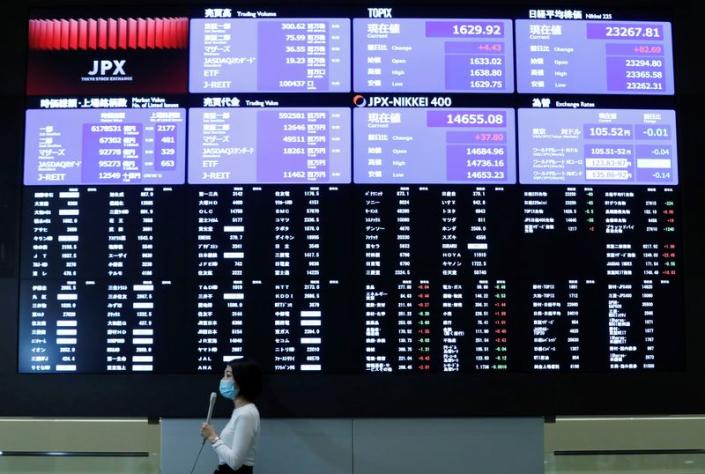Asia’s shares were in retreat at the start of the week with investors unnerved by the escalation in violence between Israel and Iran and the threat of wider conflict in the Middle East.
Gold prices rose on Monday as risk sentiment took a hit while the dollar scaled a fresh 34-year high against the yen on growing expectations that sticky inflationary pressures in the United States will keep rates there higher for longer.
Japan’s blue-chip Nikkei index dropped as investors sold equities following the weekend’s drone and missile attacks by Iran, and in the wake of a sell-off on Wall Street at the end of last week.
Also on AF: US Lawmakers’ Fury Over Huawei’s Intel AI Chip-Powered Laptop
Japanese semiconductor-sector stocks tracked their US peers lower after Beijing ordered China’s biggest telecom carriers to phase out the use of foreign chips.
The Nikkei lost 0.74% to close at 39,232.80, though that was well off early losses of as steep as 1.78%. The broader Topix slipped 0.23% or 6.44 points, to 2,753.20.
Semiconductor-testing machine maker Lasertec led chip-sector losers with a 2.59% slide. Bigger peer Advantest dropped 1.31%. Meanwhile, shippers and oil companies rose amid the heightened Middle East tensions, adding 2.41% and 1.02%, respectively.
China stocks were the outlier, posting a good start to the week with major indexes up as investors interpreted the new guidelines on the country’s capital market as a positive signal for the stock market. However, Hong Kong shares declined.
China’s securities regulator issued draft rules on Friday to strengthen the supervision of company listings, delistings and computer-driven programme trading, in a move to improve the stock market and protect investors’ interests.
China’s blue-chip CSI300 index was up 2.11%, with its financial sector sub-index 1.68% higher, the consumer staples sector rose 2.36%, the real estate index advanced 1.01% and the healthcare sub-index jumped 1.43%.
The Shanghai Composite Index rose 1.26%, or 37.90 points, to 3,057.38, but the Shenzhen Composite Index on China’s second exchange edged down 0.30%, or 5.04 points, to 1,702.68.
Chinese H-shares listed in Hong Kong fell 0.41% to 5,855.59, while the Hang Seng Index was down 0.72%, or 121.23 points, at 16,600.46.
Flight to Safety
Elsewhere across the region, Indian stocks retreated too with Mumbai’s signature Nifty 50 index down 1.10%, or 246.90 points, to 22,272.50. MSCI’s broadest index of Asia-Pacific shares outside Japan fell 0.7%.
The threat of open warfare erupting between the arch Middle East foes and dragging in the United States has left the world on tenterhooks. US President Joe Biden warned Prime Minister Benjamin Netanyahu the US will not take part in a counter-offensive against Iran.
The flight to safety sent gold up more than 0.5% to $2,356.39 an ounce and kept the dollar firm.
Oil prices, however, hardly reacted to the news, as traders had largely priced in a retaliatory attack from Iran that would likely further disrupt supply chains. That saw Brent crude futures peaking at $92.18 a barrel last week, the highest level since October.
US stock futures ticked higher, after a heavy selloff on Wall Street on Friday as results from major US banks failed to impress. S&P 500 futures and Nasdaq futures each rose about 0.4%. Eurostoxx 50 futures tacked on 0.22%, while FTSE futures slid 0.5%.
US Treasury yields held near their recent highs as traders pared back their expectations of the pace and scale of rate cuts from the Federal Reserve this year.
The benchmark 10-year yield last stood at 4.5605%, while the two-year yield held near the 5% level and was last at 4.9269%.
Bitcoin Rally Halted
A continued run of resilient US economic data, particularly last week’s hotter-than-expected inflation report, has added to the view that US rates could remain higher for longer, and that a Fed easing cycle is unlikely to commence in June.
Futures now point to about 44 basis points worth of easing expected this year, a huge pullback from the 160 bps that was priced in at the start of the year.
That sea change in the rate outlook has in turn sent the dollar on a tear, pushing it to a 34-year peak of 153.85 yen on Monday. The euro and sterling were similarly pinned near five-month lows.
A slew of Fed policymakers are due to speak this week, including Chair Jerome Powell, who could give further clarity on the future path of US interest rates.
The shift in rate expectations has halted bitcoin’s blistering rally, after the world’s largest cryptocurrency repeatedly notched fresh records this year thanks to flows into new spot bitcoin exchange-traded funds and expectations of imminent Fed cuts.
Bitcoin fell more than 3% to $65,010, also weighed down in part by the global risk-off mood.
Key figures
Tokyo – Nikkei 225 < DOWN 0.74% at 39,232.80 (close)
Hong Kong – Hang Seng Index < DOWN 0.72% at 16,600.46 (close)
Shanghai – Composite > UP 1.26% at 3,057.38 (close)
London – FTSE 100 < DOWN 0.44% at 7,960.01 (0933 BST)
New York – Dow < DOWN 1.24% at 37,983.24 (Friday close)
- Reuters with additional editing by Sean O’Meara
Read more:
China’s GDP Growth Seen Slowing in the First Quarter
China Proposes New Trading, Listing Rules to Revive Market
China Customs Data: Exports, Imports Saw Big Falls in March
China Property Fears Weigh on Hang Seng, Tech Lifts Nikkei























